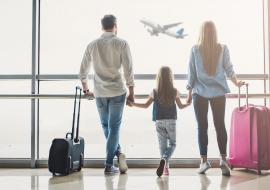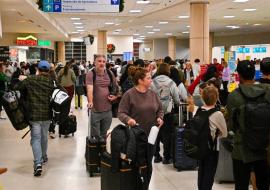Caribbean Tourism Should Recover Faster than other World Regions

The pandemic continues to cast a long shadow over the reopening of travel and tourism in the Caribbean. According to Euromonitor International’s Travel Forecast Model, the region is expected to claw back tourism spending losses by 2023 at the earliest.
As tough as this is to manage in the short term, a speedier recovery is predicted for the Caribbean compared to regions such as Europe and North America, despite getting out of the starting blocks earlier with reopening.
The slump in 2020 was also relatively less severe than elsewhere, with a sharp decline of 63% in Caribbean tourism destinations, compared to a 75% drop for world tourism, followed by an accelerated growth spurt of 74% in 2021, as the sector begins to rebound after hitting rock bottom.
According to Euromonitor International’s worst case COVID-19 scenario, where there are further lockdowns, delays to vaccination programmes and new variants that would further complicate the health situation, it could take until 2025 to return to peak 2019 tourism spending in the Caribbean.
The expectation in the baseline forecast is that by 2022 the Caribbean will stand at 85% of its previous spending levels as international travel normalises, with the world moving into the endemic stage, and benefiting from greater global consensus on digital health passport protocols for travelling abroad.
The economic outlook for North America and Europe has been upgraded for 2022, so pent-up demand and economic recovery will also fuel the recovery fire.
As uncertainty continues to dominate the travel landscape, consumers are increasingly prioritizing free cancellations when making travel bookings, so that, if need be, they can be rescheduled or refunded at no cost to them. Looking at some of the key source markets to the Caribbean including North America, the UK, France and Germany, there was a significant uplift in interest in flexible terms and conditions, jumping 14 percentage points to an average of 63.7% of consumers stating free cancellations are important to them, according to Euromonitor International’s Voice of the Consumer: Digital Survey.
Considering the dynamic situation with the virus, the shift to consumer-centric features will continue and will be fundamental to encouraging travellers to make bookings with confidence, without fear of losing out.
The same Digital Survey reveals how free upgrades remain important for 42% of consumers, including additional leg room or luggage allowance, along with in-destination wellness, spa and food and drinks perks, especially for the UK and Canada.
25% of consumers say that they look for more flexible payment terms such as deposits and paying by instalments, with this trend expected to gain momentum as inflation spikes, unemployment remains high in addition to the increasing cost of living, including for staples and energy.
In key Caribbean source markets, there has been an average jump of five percentage points in the number of people who use augmented reality or virtual reality to “try-before-you-buy” travel experiences, standing at 21% of consumers according to our Digital Survey. In a post-pandemic world, it will be more vital than ever to be transparent firstly about health and safety protocols put in place, but most importantly, to reassure consumers that these will not hamper or diminish the quality of the real life experiences of destinations that need to stay true to form.
Loyalty and being rewarded with free gifts and offers are waning in popularity in markets such as Germany and the UK, especially with younger consumers such as Generation Z, who are not as impressed or influenced by such strategies.
The impact of climate change is all too real for small island developing states including Caribbean countries that are highly vulnerable to natural disasters and climatic events such as hurricanes and cyclones that cause untold destruction, loss to human life as well as damage to property and critical infrastructure.
Source: Euromonitor International














